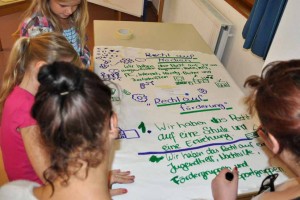
Contact
Prof. Dr. Kathrin Aghamiri
E-Mail: k.aghamiri (at) fh-muenster (dot) de
Dr. Remi Stork
E-Mail: r.stork (at) muenster (dot) de
Participation as a part of socio-educational support
Participation among children and young people within socio-educational support services such as residential care is imperative, but at the same time especially difficult. It is imperative because socio-educational support in any form directly affects its primary recipients young girls and boys and their immediate lives. Support involving temporary accommodation in fully or semi-residential institutions requires not least that children and young people come to terms with the unchosen situation of living at a new place with new people as caregivers and fellow roommates. Round table discussions held by the German Federal Government concerning the history of residential child and youth care as well as cases of sexual abuse within various institutional settings have made it clear that conditions within youth welfare organizations and agencies have in the past repeatedly restricted the rights of young people but also the opportunities afforded to them to participate in decision-making processes. Still today within residential care settings, there is an immanent risk of abuse of power carried out by residential care workers or even fellow roommates.
Although previous problems within socio-educational support services, particularly within residential care institutions, have been well addressed, in practice, there does not appear to be a broad consensus concerning the importance of democratic decision-making, co-determination and participation. Financial as well as structural logic within the field over the past two decades has contributed to the fact that more importance was placed on the treatment of developmental deficits or disorders in young girls and boys when commissioning a welfare agency as part of a support plan than in establishing and designing an enabling environment conducive to the development of participatory democratic practice. Promoting participation did not always take top priority among the financing youth offices involved.
It should however be noted that socio-educational support services in particular have had a long history of democratic child-rearing. Starting with so-called “children’s republics” dating back already more than 100 years and in which children and young people in larger residential care institutions experimented with ideas of autonomy and self-government to democracy-oriented residential group homes and communities set up in the 1970’s in many larger cities throughout Germany, residential child care is also closely connected to prominent European educators (Bernfeld, Korczak, Marenko i.a.) who all have played a significant role in the education and training of professional pedagogues.
The new federal child protection law entered into force on 1 January 2012 and with it the topic of participation in fully or semi-residential child and youth care settings has officially gained a whole new meaning. Whether public or private, agencies and institutions within socio-educational support services are now required to submit documentation concerning formulated professional practice concepts in child and youth participation in order to be granted licensing by the responsible supervisory authorities. With this action, German legislature has officially acknowledged the fundamental importance of participatory democratic practice in child rearing for the protection of children’s rights and well-being within organizational and institutional child welfare settings.
The Institute for Participation and Education can provide support in the following areas:
- Conceptual advice and support for institutions and agencies in further developing preexisting professional practice concepts to include and/or expand the scope of child and youth participation
- Advanced training courses and seminars on participation
- Organization of symposia on child and youth participation
- Development of pilot projects on child participation and education
